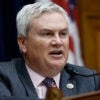A President presides over an unpopular war, while pursuing domestic goals that are the centerpiece of his actual interest. He is forced to choose between focusing his attention on developments overseas, and pushing through major domestic programs that will dramatically expand the purview of government. Which does he choose?
Barack Obama in 2010? Or Lyndon Baines Johnson in 1965?
In the 1960s, LBJ became consumed with the Vietnam War, even going so far as to have a model of the firebase at Khe Sanh built to allow him to track events there and ensure that there would be “no damn Din Bin Phoo.” While he pushed for, and got “Great Society,” it was not as broad as he’d hoped (including the lack of state-run healthcare).
Fifty years later, another Democratic President, confronted with a war in Afghanistan and Iraq, a growing Chinese economy, and global terrorism — while pursuing health care reform — has chosen to follow the exact opposite path. Rather than focus on American foreign policy, the President’s announcement that he was cancelling his trip to Indonesia and Australia makes clear that, for President Obama, his focus is on domestic issues.
The problem is that, while there are 435 members of Congress who will happily engage in domestic broadsides and policy-wonking, there is only one person who truly encapsulates American power abroad, and that is the President of the United States. For the President to postpone his foreign obligations in favor of what is hardly a domestic crisis (recalling that he had demanded the health care bill be on his desk for signing over six months ago) suggests a failure to understand the American role in the world.
Worse, the range of foreign policy issues that are confronting this President, from Iranian nuclear proliferation to continuing global economic weakness to growing threats to basic global governance (e.g., piracy, cyber-crime), are receiving short shrift, and this delay only shouts that from the roof-tops. How can the President continue to claim that Asia is a priority when a six-month late domestic reform measure trumps ties to a close ally and strategic partner in the making?
The most worrisome part is that pursuing both an expansive spending/regulatory domestic program and a major war resulted in a permanent loss of economic growth. The Obama administration may not be spending as much on the war, but their unprecedented deficits and debilitating regulatory agenda raise the specter that the coming decades will reveal persistently high unemployment and slow wage growth.






























